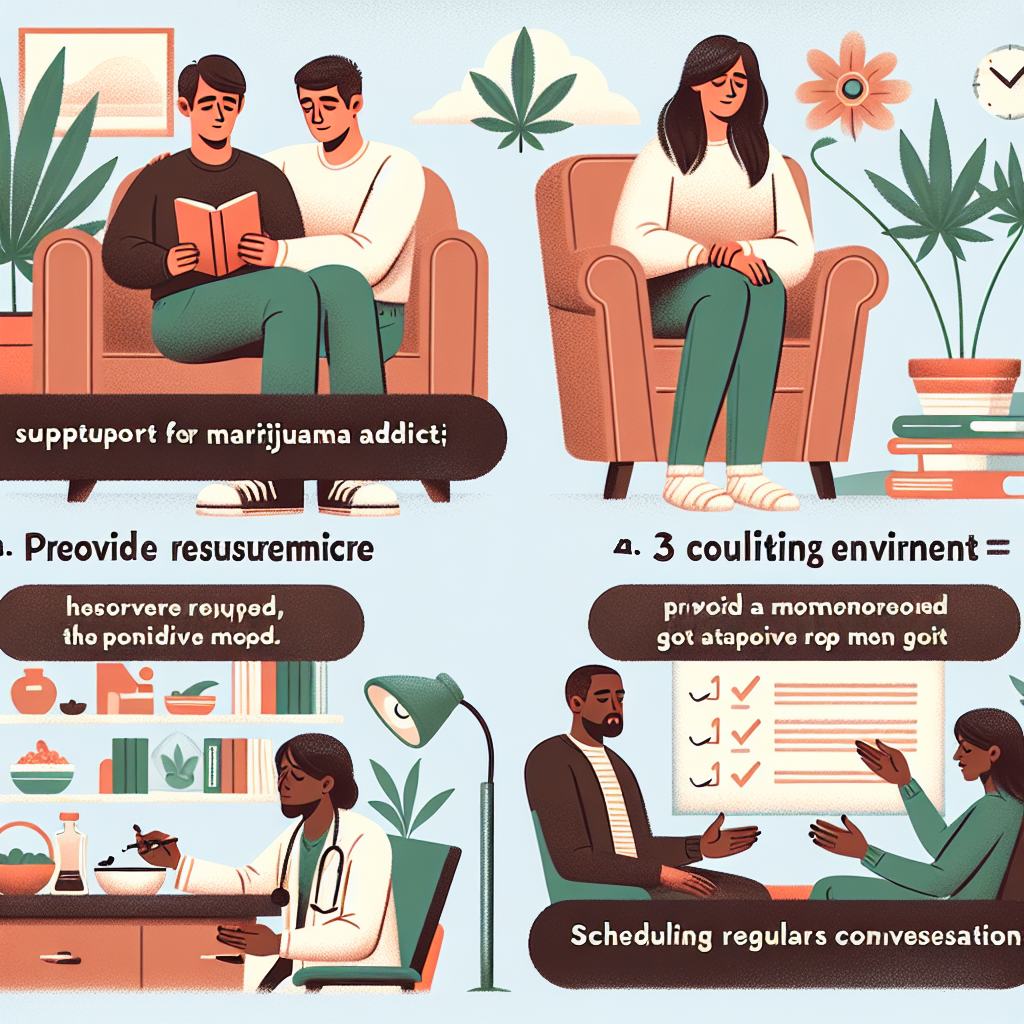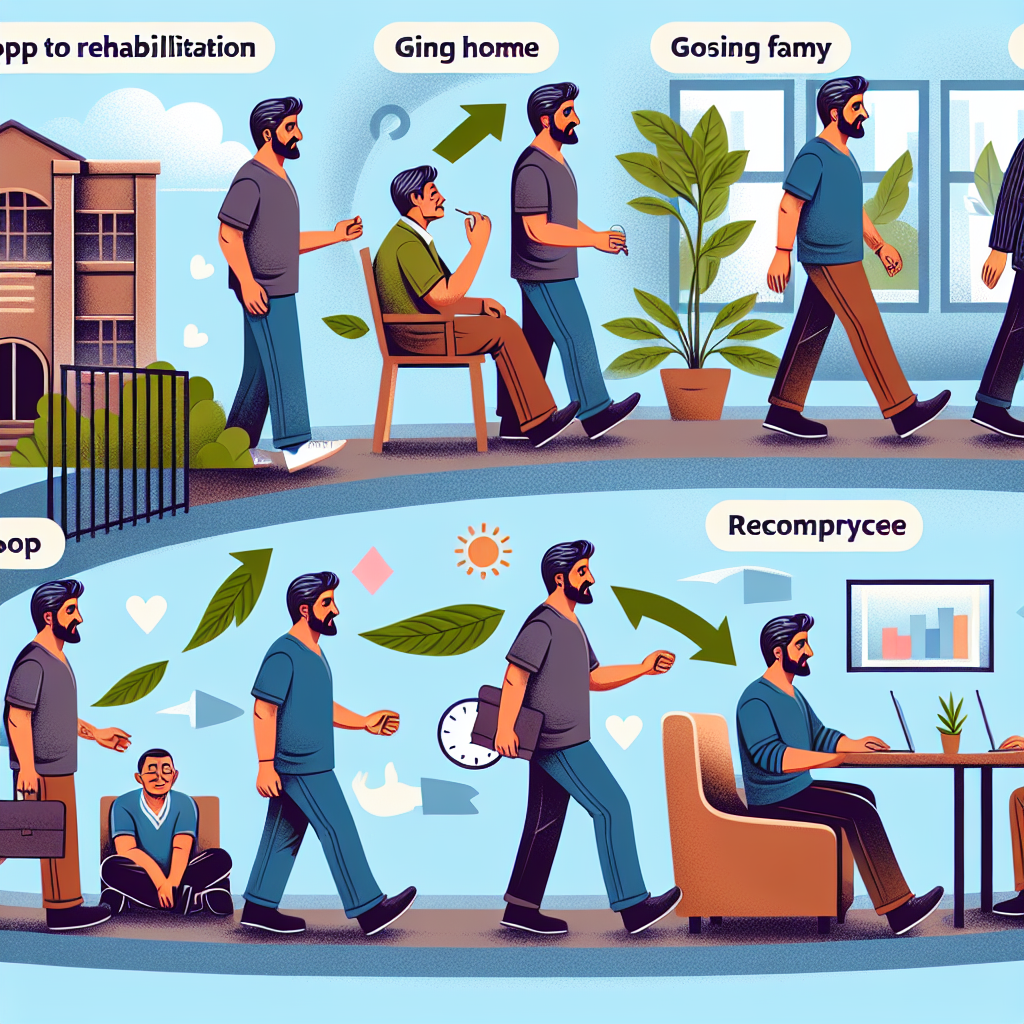-
Table of Contents
- Introduction
- Understanding the Recovery Process: Key Steps to Support Your Loved One
- Effective Communication Strategies for Supporting Marijuana Addiction Recovery
- Creating a Supportive Environment: Practical Tips for Family and Friends
- Encouraging Healthy Habits and Activities During Marijuana Addiction Recovery
- Q&A
- Conclusion
“Empathy, Encouragement, and Understanding: Your Guide to Supporting a Loved One’s Recovery from Marijuana Addiction”
Introduction

Supporting a loved one recovering from marijuana addiction requires understanding, patience, and a proactive approach. Recovery is a challenging journey that involves both physical and psychological aspects, and your support can play a crucial role in their success. This guide will provide you with practical strategies to help your loved one navigate their path to sobriety, including creating a supportive environment, encouraging professional treatment, and fostering healthy lifestyle changes. By being informed and compassionate, you can make a significant difference in their recovery process.
Understanding the Recovery Process: Key Steps to Support Your Loved One
Supporting a loved one recovering from marijuana addiction can be a challenging yet profoundly rewarding journey. Understanding the recovery process is crucial to providing the right kind of support. The first step in this journey is to educate yourself about marijuana addiction and its effects. By gaining a comprehensive understanding of the substance and its impact on the brain and behavior, you can better empathize with your loved one’s struggles and needs. This knowledge will also help you recognize the signs of relapse and understand the importance of a supportive environment.
Transitioning from understanding to action, it is essential to create a safe and non-judgmental space for your loved one. Open communication is the cornerstone of this supportive environment. Encourage your loved one to share their feelings and experiences without fear of criticism or judgment. Listening actively and empathetically can make a significant difference in their recovery journey. It is important to remember that recovery is not a linear process; there will be ups and downs. Patience and understanding are key during these times.
In addition to emotional support, practical assistance can also play a vital role in the recovery process. Helping your loved one establish a routine can provide structure and stability, which are often crucial in the early stages of recovery. This might include assisting with daily tasks, encouraging healthy habits such as regular exercise and balanced nutrition, and helping them find new hobbies or activities to replace the time previously spent using marijuana.
Moreover, professional help is often necessary for a successful recovery. Encourage your loved one to seek therapy or counseling, and support them in attending these sessions. Therapists and counselors can provide specialized strategies and coping mechanisms that are tailored to individual needs. Additionally, support groups can offer a sense of community and shared experience, which can be incredibly comforting and motivating. If possible, attend family therapy sessions together to address any underlying issues and strengthen your relationship.
As your loved one progresses in their recovery, it is important to celebrate their achievements, no matter how small. Acknowledging their efforts and milestones can boost their confidence and motivation. However, it is equally important to be prepared for setbacks. Relapse is a common part of the recovery process, and it does not signify failure. Instead of reacting with disappointment or frustration, approach the situation with compassion and support. Help your loved one understand that setbacks are opportunities for learning and growth.
Furthermore, taking care of yourself is crucial when supporting someone in recovery. It can be emotionally and physically draining, and neglecting your own well-being can lead to burnout. Ensure that you have your own support system in place, whether it be friends, family, or a therapist. Practicing self-care and setting boundaries will enable you to provide sustained support without compromising your own health.
In conclusion, supporting a loved one recovering from marijuana addiction requires a combination of empathy, patience, practical assistance, and professional help. By creating a supportive environment, encouraging open communication, and celebrating progress while being prepared for setbacks, you can play a pivotal role in their recovery journey. Remember, your support can make a significant difference, and together, you can navigate the path to a healthier, addiction-free life.
Effective Communication Strategies for Supporting Marijuana Addiction Recovery
Supporting a loved one recovering from marijuana addiction can be a challenging yet profoundly rewarding experience. Effective communication is crucial in this journey, as it fosters understanding, trust, and encouragement. To begin with, it is essential to approach conversations with empathy and without judgment. Recognizing that addiction is a complex condition rather than a moral failing can help you maintain a compassionate perspective. By doing so, you create a safe space where your loved one feels understood and supported, which is vital for their recovery.
Active listening is another cornerstone of effective communication. This involves not just hearing the words your loved one says but also understanding the emotions and struggles behind those words. When they share their experiences, resist the urge to interrupt or offer immediate solutions. Instead, show that you are fully present by nodding, maintaining eye contact, and occasionally summarizing what they have said to ensure you have grasped their message. This practice not only validates their feelings but also strengthens your bond, making it easier for them to open up in the future.
Moreover, it is important to set boundaries and communicate them clearly. While your support is invaluable, it is also crucial to protect your own well-being. Establishing boundaries helps prevent burnout and ensures that you can continue to offer support in a sustainable manner. For instance, you might agree on specific times to discuss their recovery, allowing both of you to have space for other aspects of your lives. Communicating these boundaries respectfully can help maintain a healthy balance in your relationship.
Encouragement and positive reinforcement play a significant role in supporting recovery. Celebrate their milestones, no matter how small they may seem. Acknowledging their progress can boost their confidence and motivation to continue on their path to recovery. Phrases like “I’m proud of you” or “You’ve made great progress” can have a profound impact. However, it is equally important to be patient and understanding during setbacks. Recovery is rarely a linear process, and there will be ups and downs. During challenging times, remind them of their strengths and past successes to help them regain their footing.
In addition to verbal communication, non-verbal cues are equally important. Your body language, facial expressions, and tone of voice can convey support and understanding. A warm smile, a reassuring touch, or a gentle tone can often communicate more than words alone. Being mindful of these non-verbal signals can enhance the effectiveness of your communication and provide additional comfort to your loved one.
Furthermore, educating yourself about marijuana addiction and recovery can enhance your ability to support your loved one. Understanding the nature of addiction, the challenges of withdrawal, and the strategies for maintaining sobriety can help you offer informed and relevant support. This knowledge can also reduce any misconceptions or stigma you might unconsciously hold, allowing you to approach the situation with greater empathy and insight.
Lastly, encourage open and honest communication by being a role model. Share your own feelings and experiences, demonstrating that it is okay to be vulnerable. This can create a reciprocal environment where your loved one feels more comfortable sharing their own struggles and triumphs. By fostering a relationship built on mutual trust and open dialogue, you can provide a solid foundation for their recovery journey.
In conclusion, supporting a loved one recovering from marijuana addiction requires a blend of empathy, active listening, clear boundaries, positive reinforcement, and informed understanding. By employing these effective communication strategies, you can play a pivotal role in their recovery, offering the support and encouragement they need to overcome their addiction and build a healthier, more fulfilling life.
Creating a Supportive Environment: Practical Tips for Family and Friends
Supporting a loved one recovering from marijuana addiction can be a challenging yet profoundly rewarding journey. Creating a supportive environment is crucial for their recovery, and as family and friends, your role is indispensable. To begin with, understanding the nature of addiction is essential. Marijuana addiction, like any other substance dependency, is a complex condition that affects both the mind and body. Recognizing this complexity helps in approaching the situation with empathy and patience.
One of the first steps in creating a supportive environment is to educate yourself about marijuana addiction. Knowledge is power, and by understanding the symptoms, triggers, and challenges associated with this addiction, you can better empathize with your loved one’s struggles. This understanding also enables you to provide informed support, which can significantly enhance their recovery process. Additionally, attending support groups or counseling sessions together can be beneficial. These platforms offer a safe space for sharing experiences and learning from others who are in similar situations.
Communication is another cornerstone of a supportive environment. Open, honest, and non-judgmental conversations can help your loved one feel understood and valued. It’s important to listen actively and validate their feelings without offering unsolicited advice or criticism. Encouraging them to express their thoughts and emotions can foster a sense of trust and safety. Moreover, setting clear and healthy boundaries is crucial. While it’s important to be supportive, it’s equally important to take care of your own well-being. Establishing boundaries ensures that you can provide consistent support without feeling overwhelmed or resentful.
Creating a structured and stable environment can also aid in their recovery. Encouraging a routine that includes healthy habits such as regular exercise, balanced nutrition, and adequate sleep can have a positive impact on their physical and mental health. Engaging in activities that promote relaxation and stress relief, such as yoga, meditation, or hobbies, can also be beneficial. These activities not only provide a distraction from cravings but also help in building a healthier lifestyle.
Furthermore, it’s important to celebrate small victories and milestones in their recovery journey. Acknowledging their efforts and progress, no matter how small, can boost their confidence and motivation. Positive reinforcement can be a powerful tool in encouraging them to stay committed to their recovery goals. However, it’s equally important to be prepared for setbacks. Relapses can happen, and it’s crucial to approach them with compassion rather than disappointment. Understanding that recovery is a gradual process with ups and downs can help in maintaining a supportive and non-judgmental attitude.
In addition to emotional support, practical assistance can also make a significant difference. Helping them find professional treatment options, such as therapy or rehabilitation programs, can provide the necessary tools and resources for their recovery. Offering to accompany them to appointments or support group meetings can also show your commitment to their well-being.
Lastly, fostering a positive and drug-free environment is essential. Removing any triggers or temptations from the home and encouraging a social circle that supports sobriety can create a conducive atmosphere for recovery. Surrounding your loved one with positive influences and activities can help them stay focused on their recovery goals.
In conclusion, supporting a loved one recovering from marijuana addiction requires a combination of empathy, education, communication, and practical assistance. By creating a supportive environment, you can play a pivotal role in their journey towards a healthier and more fulfilling life. Remember, your support and encouragement can make a world of difference in their recovery process.
Encouraging Healthy Habits and Activities During Marijuana Addiction Recovery
Supporting a loved one recovering from marijuana addiction can be a challenging yet profoundly rewarding experience. Encouraging healthy habits and activities is crucial in this journey, as it not only aids in their recovery but also helps rebuild their confidence and sense of purpose. To begin with, understanding the importance of a balanced lifestyle is essential. A well-rounded routine that includes physical activity, nutritious eating, and adequate rest can significantly enhance their overall well-being and resilience.
Physical activity is a cornerstone of healthy living and can be particularly beneficial for someone in recovery. Exercise releases endorphins, which are natural mood lifters, and can help combat the anxiety and depression that often accompany withdrawal. Encouraging your loved one to engage in regular physical activities, whether it’s a morning jog, yoga, or even a dance class, can provide them with a positive outlet for their energy and emotions. Moreover, participating in these activities together can strengthen your bond and offer them a sense of companionship and support.
In addition to physical activity, fostering a nutritious diet is equally important. A balanced diet rich in fruits, vegetables, lean proteins, and whole grains can help restore the body’s natural balance and improve mental clarity. You can support your loved one by preparing healthy meals together, which not only ensures they are eating well but also provides an opportunity for meaningful interaction. Sharing recipes, cooking together, and even planning meals can become enjoyable activities that promote a sense of normalcy and routine.
Furthermore, establishing a regular sleep schedule is vital for recovery. Quality sleep is essential for mental and physical health, and it can be disrupted during the withdrawal phase. Encouraging your loved one to maintain a consistent sleep routine, perhaps by creating a calming bedtime ritual or reducing screen time before bed, can help them achieve better rest. A well-rested mind and body are more equipped to handle the challenges of recovery.
Beyond these foundational habits, engaging in new hobbies and activities can be incredibly beneficial. Exploring interests that do not involve substance use can help your loved one rediscover joy and fulfillment. Whether it’s picking up a musical instrument, painting, gardening, or joining a book club, these activities can provide a sense of accomplishment and a distraction from cravings. Encouraging your loved one to try new things and supporting them in their endeavors can help them build a new identity that is not centered around marijuana use.
Additionally, fostering social connections is crucial. Isolation can be a significant barrier to recovery, so encouraging your loved one to reconnect with friends and family or join support groups can provide them with a network of understanding individuals. These connections can offer emotional support, share experiences, and provide a sense of community, all of which are invaluable during recovery.
Lastly, it’s important to practice patience and empathy. Recovery is a gradual process with its ups and downs. Being there for your loved one, offering a listening ear, and celebrating their small victories can make a significant difference. Your unwavering support and encouragement can instill hope and motivation, reminding them that they are not alone in their journey.
In conclusion, supporting a loved one recovering from marijuana addiction involves encouraging healthy habits and activities that promote physical, mental, and emotional well-being. By fostering a balanced lifestyle, exploring new interests, and building strong social connections, you can help your loved one navigate the path to recovery with confidence and resilience. Your support can be a beacon of hope, guiding them towards a healthier, more fulfilling life.
Q&A
1. **Question:** What is one of the first steps to support a loved one recovering from marijuana addiction?
**Answer:** Encourage them to seek professional help, such as counseling or a support group.
2. **Question:** How can you help create a supportive environment for someone recovering from marijuana addiction?
**Answer:** Remove any marijuana or related paraphernalia from the home and avoid using substances around them.
3. **Question:** What is an important emotional support strategy for someone recovering from marijuana addiction?
**Answer:** Be patient and listen without judgment, offering empathy and understanding.
4. **Question:** How can you assist a loved one in developing healthy habits during their recovery from marijuana addiction?
**Answer:** Encourage and participate in healthy activities together, such as exercise, hobbies, or mindfulness practices.
Conclusion
Supporting a loved one recovering from marijuana addiction involves several key steps: educating oneself about addiction and recovery, offering emotional support without judgment, encouraging professional treatment and therapy, helping to create a stable and drug-free environment, and being patient and understanding throughout the process. It’s crucial to maintain open communication, set healthy boundaries, and take care of one’s own well-being to effectively support the loved one on their journey to recovery.



